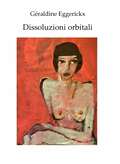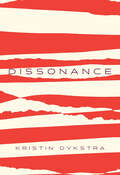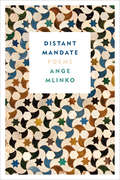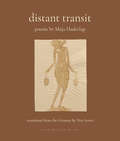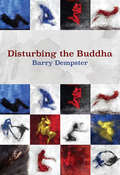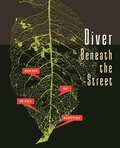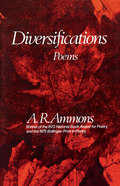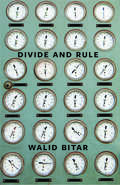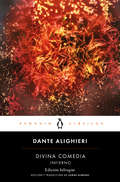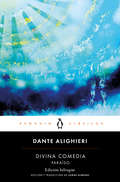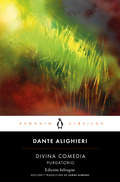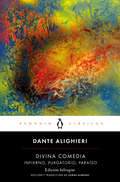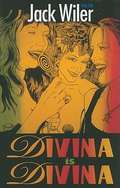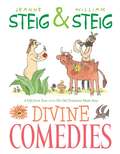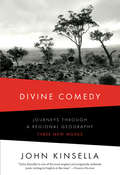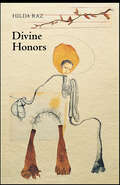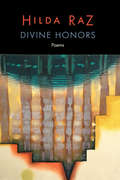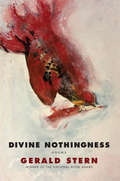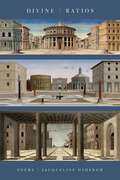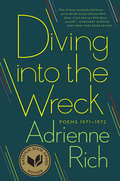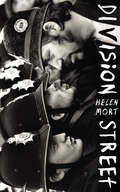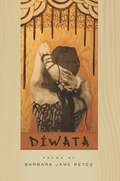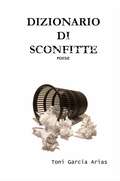- Table View
- List View
Dissoluzioni Orbitali
by Géraldine EggerickxTre brevi racconti d'amore che si intrecciano e si dissolvono in un'unica dissoluzione orbitale. La prima storia è ambientata in Algeria e racconta il dramma esistenziale di Doura, una donna kabyle che confessa il suo passato in punto di morte. Il secondo racconto narra la storia di un tradimento e la terza e ultima parte mostra il punto di vista di due amanti che si dissolvono nella follia del loro amore.
Dissonance (Phoenix Poets)
by Kristin DykstraA collection of poems and photographs that take the foothills of Vermont’s Green Mountains as a microcosm for considering climate change, borders, and community life. In Dissonance, translator Kristin Dykstra’s first book of original poetry, the author leads us to inner worlds shaped partly by the New England countryside, tracking shifts in the region’s nature, infrastructure, and people, while sharing observations on borders and climate catastrophe that reverberate globally. Dykstra condenses signs of urban expansion, economic division, and battles over democracy into an innovative meditation. With a dynamic approach to form, musicality, and scope, Dissonance explores ways of experiencing regional landscapes and imagined communities in the twenty-first century. Through her extended sequence of prose poems, photographs, and lyric fragments, Dykstra merges clips from documents and dialogues with observations drawn from two local libraries and her daily walks down a dirt road through Vermont’s foothills. As she moves down this public road, which lies within the nation’s federally designated hundred-mile border zone, she finds a daily convergence of tensions. Dissonance asks how poetry can unsettle impressions of a place, and how that process, in turn, disturbs impressions of self, of others, and of time itself. Dissonance is the recipient of the third annual Phoenix Emerging Poet Book Prize.
Distance Learning
by Angela SorbyDistance Learning is a vividly visualized and well thought-out book of poetry that carries the reader on journeys through both space and time.
Distant Mandate: Poems
by Ange MlinkoIn Distant Mandate, Ange Mlinko moves between the tormented southern landscape, with its alternately arid and flooded scrublands, and the imaginative landscapes of Western art. Guided by her spiritual forbears—Orpheus, Mallarmé, Pound, Yeats, and others—Mlinko deftly places herself within the tradition of the poet in protest against the obduracy of the real.Mlinko takes the title from a piece by Laszló Krasznahorkai on the unknowable origins of the Alhambra, the monument “for the sight of which there is only a distant mandate . . . [one] can see, in any event, the moment of creation of the world, of course all the while understanding nothing of it.” This distant mandate, also the “bitter ideal” of Mallarmé, is the foundation upon which all works of art are composed—the torment of eros and the intimation of war. Myth is central to these poems; some are based on the story Cupid and Psyche, others serve as odes to Aphrodite or as explorations of the myth of Orpheus and Eurydice. In Distant Mandate, Mlinko has given us a shimmering and vibrant collection, one that shows us not only how literature imagines itself through life but also how life reimagines itself through literature.
Distant Transit: Poems
by Maja HaderlapFrom a groundbreaking Slovenian-Austrian poet comes an evocative, captivating collection on searching for home in a landscape burdened with violent history.At its core, Distant Transit is an ode to survival, building a monument to traditions and lives lost. Infused with movement, Maja Haderlap&’s Distant Transit traverses Slovenia&’s scenic landscape and violent history, searching for a sense of place within its ever-shifting boundaries. Avoiding traditional forms and pronounced rhythms, Haderlap unleashes a flow of evocative, captivating passages whose power lies in their associative richness and precision of expression, vividly conjuring Slovenia&’s natural world––its rolling meadows, snow-capped alps, and sparkling Adriatic coast. Belonging to the Slovene ethnic minority and its inherited, transgenerational trauma, Haderlap explores the burden of history and the prolonged aftershock of conflict––warm, lavish pastoral passages conceal dark memories, and musings on the way language can create and dissolve borders reveal a deep longing for a sense of home.
Disturbing the Buddha
by Barry DempsterDisturbing the Buddha, Barry Dempster's fifteenth collection, is disarmingly conversational and, like the best conversations, it moves between reverence and irreverence, sincerity and irony as it grapples with love, loss, loneliness and simple lack of luck--the "three-leaf clovers" so much more plentiful than the four. Dempster's wit and playful metaphoric turns let us take for granted the courage needed to admit to lif'’s ongoing intensities, disruptions, and indignities. In these poems, a forty-year-old man dons a pink plastic crown on his niece's order; a solitary man watches a Nicole Kidman rom-com with his cat; an aging Aphrodite, more mortal than god, suffers hot flashes. Like the mystic poets he addresses in the book’s final section, Dempster respects the unknown as he comes to terms with the ups and downs of the all-too-human condition. Shifting effortlessly from light-hearted ode to solemn elegy, Dempster offers no touch-up jobs; instead we find a love of the flaw, a generosity toward it even as he exposes it. This is a poetry of inclusiveness, engaging both our better and worse angels, baring its Achilles' heel and trusting us to do likewise.
Diver Beneath the Street (Made in Michigan Writers Series)
by Petra KuppersA decaying psychogeography unfurls the landscapes of the 1967–69 Michigan Murders, the 2019 Detroit serial killer, and the COVID-19 lockdown in this visceral poetry collection. Author, performance artist, and disability culture activist Petra Kuppers dissects traces of violence in the richness of the soil while honoring lost community members. Dynamic and somatic poems traverse the realms of urban space, wild rivers, and the hinterlands of suburbia, glimpsing the decay of bodies, houses, carpets, hair, and bones by way of ecopoetry. Poems like "Reintegration" and "Earth Séance" delve into cycles of decomposition and decreasing biodiversity across the micro- and macroworlds. Others such as "Dancing Princesses" tie timeless fairy-tale tropes of violence toward women to modern murders and lived experience. Moments in lockdown are embodied through somatic exploration of nature and self in works like "Dear White Pine in My Garden." This evocative entanglement of life and death, joy and horror, natural and artificial processes and particles offers an intriguing lyrical and poetic quality as well as unique perspectives through the lenses of feminist, queer, and disability studies.
Diversifications: Poems
by A. R. AmmonsDiversifications is a collection of shorter poems by the poet whose Collected Poems won the National Book Award. The poems are on a diversity of subjects, but through them all runs the strong unity of vision that has led critic Geoffrey Hartman to acclaim Ammons as "a major American poet" (New York Times Book Review). "If his importance was suspected before," wrote the poet John Ashbery in The New York Review of Books, "it is now confirmed." Ammons came late to poetry, and has come even more lately into national recognition. That recognition is solid, however, and can only be increased by this, his latest volume.
Divide and Rule
by Walid BitarIn Divide and Rule, Walid Bitar delivers a sequence of dramatic monologues, variations on the theme of power, each in rhymed quatrains. Though the pieces grow out of Bitar's personal experiences over the last decade, both in North America and the Middle East, he is not primarily a confessional writer. His work might be called cubist, the perspectives constantly shifting, point followed by counterpoint, subtle phrase by savage outburst. Bitar's enigmatic speakers are partially rational creatures, have some need to explain, and may succeed in partially explaining, but, in the end, communication and subterfuge are inseparable - must, so to speak, co-exist.
Divina Comedia. Infierno: Primera Parte: Infierno (Illustrated By Dore Ser. #No. 49)
by Dante AlighieriNueva edición bilingüe del Infierno, con introducción general, prólogo, traducción y notas del poeta español Jorge Gimeno En el Infierno, primero de los tres volúmenes que componen la Divina Comedia, Dante relata su viaje al inframundo desde el encuentro fortuito con su guía, el poeta latino Virgilio, hasta el avistamiento de Lucifer en el fondo del abismo. Viaje simbólico por el alma humana, su recorrido es un inolvidable catálogo de los pecadores que merecen la pena eterna según la escatología medieval. Pero su visión poética trasciende también el tiempo y, con sus horrores, alumbra la edad moderna que en parte ayudó a crear. La presente edición, a cargo del poeta españo Jorge Gimeno, incluye el texto original, una soberbia traducción en endecasílabos, una introducción general, un prólogo y un iluminador aparato de notas.
Divina Comedia. Paraíso (edición bilingüe)
by Dante AlighieriNueva edición bilingüe del Paraíso, con prólogo, traducción y notas del poeta español Jorge Gimeno En el Paraíso, último volumen y culminación necesaria de la Comedia, Dante asciende a los cielos y consigue lo impensable: alcanzar el Empíreo, el no lugar y no tiempo de la presencia divina, para regresar a la tierra y contarlo. El sentido último del libro no es otro que místico, y los versos finales del poema se resuelven en la divinidad. Pero Dante se eleva en esta cántica también hasta la más alta expresión de su poesía, un estilo sacro, elevado, inimitable e irremplazable, que resume su destino literario. La presente edición, a cargo del poeta español Jorge Gimeno, incluye el texto original, una soberbia traducción en endecasílabos, un prólogo y un iluminador aparato de notas.
Divina Comedia. Pugatorio (Illustrated By Dore Ser.)
by Dante AlighieriNueva edición bilingüe del Purgatorio, con introducción general, prólogo, traducción y notas del poeta español Jorge Gimeno El Purgatorio es la cántica del cambio, el paso de Dante por el reino en que las almas, mediante sus padecimientos y la oración de los vivos, conquistan la salvación que ya han obtenido. Pero no menos importante es el aprendizaje del poeta, que amplía su conocimiento de la realidad verdadera a través de las revelaciones del camino. Tras un viaje entre lo velado y lo desvelado, lo que es y lo que no es, Dante se reencontrará con Beatriz y se dirigirá de su mano al bien supremo, un poco más dueño de su destino. La presente edición, a cargo del poeta español Jorge Gimeno, incluye el texto original, una soberbia traducción en endecasílabos, un prólogo y un iluminador aparato de notas.
Divina Comedia: Infierno | Purgatorio | Paraíso (edición bilingüe)
by Dante AlighieriUn estupendo estuche con los tres volúmenes de la Divina Comedia, en una nueva edición y traducción de Jorge Gimeno. La Divina Comedia relata el viaje de Dante Alighieri por el infierno, el purgatorio y el paraíso en tres grandes cánticas. En el Infierno, el gran poeta italiano relata su viaje al inframundo desde el encuentro fortuito con su guía, el poeta latino Virgilio, hasta el avistamiento de Lucifer en el fondo del abismo. Viaje simbólico por el alma humana, su recorrido es un inolvidable catálogo de los pecadores que merecen la pena eterna según la escatología medieval. Sin embargo, su visión poética trasciende también el tiempo y, en sus horrores, alumbra la edad moderna que en parte ayudó a crear. El Purgatorio es la cántica del cambio, el paso del poeta por el reino en que las almas, mediante sus padecimientos y la oración de los vivos, conquistan la salvación que ya han obtenido. Pero no menos importa el aprendizaje del poeta, que amplía su conocimiento de la realidad verdadera a través de las revelaciones que le ofrece el camino. Tras un viaje entre lo velado y lo desvelado, lo que es y lo que no es, Dante se reencontrará con Beatriz y se dirigirá de su mano al bien supremo, ya un poco más dueño de su destino. En el Paraíso, culminación necesaria de la Comedia, Dante asciende a los cielos y consigue lo impensable: alcanzar el Empíreo, el no lugar y no tiempo de la presencia divina, para luego regresar a la tierra y contarlo. El sentido último del libro no es otro que místico, y los versos finales del poema se resuelven en la divinidad. Pero Dante se eleva en esta cántica también hasta la más alta expresión de su poesía, un estilo sacro, inimitable e irremplazable, que resume su destino literario. La presente edición, a cargo del poeta español Jorge Gimeno, incluye el texto original, una soberbia traducción en endecasílabos, una introducción general, un prólogo y un iluminador aparato de notas.
Divina Is Divina: Poems
by Jack WilerIn this posthumous collection, attention is paid to the present moment. Wiler examines, with humor, compassion and fearlessness, the pleasures in life--especially the varieties of love--from friendship to sex--and how we are capable of ruining those pleasures for ourselves or for others. Jack helps us understand that life and death are each, in its own way, gifts we must live with relish, abandon and commitment.
Divine Comedies
by William Steig Jeanne SteigBeloved children's book author Jeanne Steig gives some spice, pizzazz, and a little bit of cheek to well-known classic tales from the Old Testament and Greek mythology, filled with saucy illustrations by Caldecott winner and creator of Shrek!, William Steig.Who but Jeanne and William Steig would tackle retelling the Old Testament and the Greek myths? The cheekiest of the classic Steig books--The Old Testament Made Easy and A Gift from Zeus--turn the stories you know upside down and are bound together in this divine, deluxe edition for the first time.
Divine Comedy: Three New Works
by John Kinsella"One of the most original and poignantly authentic poets writing in English."--Harold Bloom A three-part, epic work challenging our notions about the environment by Australia's preeminent poet of the natural world. Consisting of Purgatorio: Up Close, Paradiso: Rupture, and Inferno: Leisure Centre, John Kinsella's "distractions" on Dante's Divine Comedy journey through time and space. Set in a wheat-belt Western Australia, these poems are a phantasmagoria of the real and imagined, depicting nature in its full regalia, resisting forces of environmental damage and human indifference.
Divine Honors (Wesleyan Poetry Series)
by Hilda RazWinner of the Nebraska Book Award for Poetry (2002)This elegant and moving collection documents Hilda Raz's experience with breast cancer. The journey, from diagnosis to chemotherapy to mastectomy, from denial to humor to grief and rage, is ultimately one of courage and creativity. The poems themselves are accessible and finely wrought. They are equally testaments to Raz's insistence on making an order out of chaos, of finding ways to create and understand and eventually accept new definitions of good and evil, health, blame, personal boundaries — in short, a new sense of self. These poems remain intimately bound to the world and of the senses, becoming documents of transformation.
Divine Honors: Poems
by Hilda RazThis elegant and moving collection documents Hilda Raz&’s experience with breast cancer. The journey, from diagnosis to chemotherapy to mastectomy, from denial to humor to grief and rage, is ultimately one of courage and creativity. The poems themselves are accessible and finely wrought. They are equally testaments to Raz's insistence on making an order out of chaos, of finding ways to create and understand and eventually accept new definitions of good and evil, health, blame, and personal boundaries—in short, a new sense of self. These poems remain intimately bound to the world and of the senses, becoming documents of transformation.
Divine Nothingness: Poems
by Gerald SternFrom the National Book Award-winning author of This Time, a new volume of poems that explore the very nature of existence. Divine Nothingness is a meditative reflection on the poet's past and an elegy to love and the experience of the senses in the face of mortality. From the Jersey side of the Delaware River in Lambertville, Gerald Stern explores questions about who and why we are, locating nothingness in the divine and the divine in nothingness. From "What Brings Me Here?" Here I am again and what brings me here to the same wooden bench preaching to the city of Lambertville surrounded by mayapples? For who in the hell is going to lie down with whom in the hell, either inside or outside?
Divine Ratios: Poems
by Jacqueline OsherowThe reach of Divine Ratios is global, ranging from Tang Dynasty China and the Florentine Renaissance to contemporary Baltimore, post–World War II Berlin, and the landscapes of the Mountain West. The speed and mobility evoked in this new collection by Jacqueline Osherow are not only physical—a traveler’s movement in a crowded, thrilling world—but imaginative, and its poetic idiom is no less varied, as a breezy conversational tone serves as a counterpoint to traditional form. With striking juxtapositions of natural and cultural wonders, this enrapturing volume asks, what is the right proportion—or “ratio”—for living in a world of such splendors, horrors, and possibilities?
Diving into the Wreck: Poems 1971-1972
by Adrienne RichIn her seventh volume of poetry, Adrienne Rich searches to reclaim--to discover--what has been forgotten, lost, or unexplored.<P><P> "I came to explore the wreck. / The words are purposes. / The words are maps. / I came to see the damage that was done / and the treasures that prevail." These provocative poems move with the power of Rich's distinctive voice. <P> Winner of the National Book Award
Division Street
by Helen Mort*SHORTLISTED FOR THE T.S ELIOT PRIZE AND COSTA POETRY AWARD 2013*'A stone is lobbed in '84, hangs like a star over Orgreave. Welcome to Sheffield. Border-land,our town of miracles...' - 'Scab'From the clash between striking miners and police to the delicate conflicts in personal relationships, Helen Mort's stunning debut is marked by distance and division. Named for a street in Sheffield, this is a collection that cherishes specificity: the particularity of names; the reflections the world throws back at us; the precise moment of a realisation. Distinctive and assured, these poems show us how, at the site of conflict, a moment of reconciliation can be born.
Diwata
by Barbara Jane ReyesTagalog is a language spoken by twenty-two million people in the Philippines. Diwata is a Tagalog term meaning "muse." Diwata is also a term for a mythical being who resides in nature, and who human communities must acknowledge, respect, and appease in order to live harmoniously in this world.In her book Diwata, Barbara Jane Reyes frames her poems between the Book of Genesis creation story and the Tagalog creation myth, placing her work somewhere culturally between both traditions. Also setting the tone for her poems is the death and large shadow cast by her grandfather, a World War II veteran and Bataan Death March survivor, who has passed onto her the responsibility of remembering. Reyes' voice is grounded in her community's traditions and histories, despite war and geographical dislocation.From "Estuary 2":She was born with fins and fishtail,A quick blade slicing water.She was her father's mermaid child,A river demon, elders said.She mimicked her cetaceous brothers,Abalone diving bluest depths.She polished smooth her brothers' masks,Inlaid nacre half moon eyes.She lit oak pyres and bade the windA whispered requiem.Barbara Jane Reyes is author of two previous poetry collections including Poeta en San Francisco, which was awarded the 2005 James Laughlin Award from the Academy of American Poets. She was born in Manila and raised in the San Francisco Bay Area. She works as adjunct professor in Philippine studies at the University of San Francisco.From National Book Critics Circle:"Diwata as a mythological invocation takes teh reader back to pre-colonial Philippines when the belief in these god and goddesses shaped the everyday lives on the Southeast Asian archipelago. They have now become your muses as you reach toward this cultural legacy to shape a distinct postmodern poetics in which yo u don't simply erase colonial history- you build with that narrative as well."
Diwata (American Poets Continuum #123)
by Barbara Jane ReyesTagalog is a language spoken by twenty-two million people in the Philippines. Diwata is a Tagalog term meaning "muse." Diwata is also a term for a mythical being who resides in nature, and who human communities must acknowledge, respect, and appease in order to live harmoniously in this world.In her book Diwata, Barbara Jane Reyes frames her poems between the Book of Genesis creation story and the Tagalog creation myth, placing her work somewhere culturally between both traditions. Also setting the tone for her poems is the death and large shadow cast by her grandfather, a World War II veteran and Bataan Death March survivor, who has passed onto her the responsibility of remembering. Reyes' voice is grounded in her community's traditions and histories, despite war and geographical dislocation.From "Estuary 2":She was born with fins and fishtail,A quick blade slicing water.She was her father's mermaid child,A river demon, elders said.She mimicked her cetaceous brothers,Abalone diving bluest depths.She polished smooth her brothers' masks,Inlaid nacre half moon eyes.She lit oak pyres and bade the windA whispered requiem.Barbara Jane Reyes is author of two previous poetry collections including Poeta en San Francisco, which was awarded the 2005 James Laughlin Award from the Academy of American Poets. She was born in Manila and raised in the San Francisco Bay Area. She works as adjunct professor in Philippine studies at the University of San Francisco.From National Book Critics Circle:"Diwata as a mythological invocation takes teh reader back to pre-colonial Philippines when the belief in these god and goddesses shaped the everyday lives on the Southeast Asian archipelago. They have now become your muses as you reach toward this cultural legacy to shape a distinct postmodern poetics in which yo u don’t simply erase colonial history- you build with that narrative as well."
Dizionario di Sconfitte
by Toni García AriasQuesta è la mia seconda raccolta di poesie. È stata pubblicata in edizione cartacea dalla casa editrice spagnola Nausicaa. È sta accolta con successo nei canali multimediali. Per il momento tradotto in portoghese e italiano .
